Steve Hackett 2017
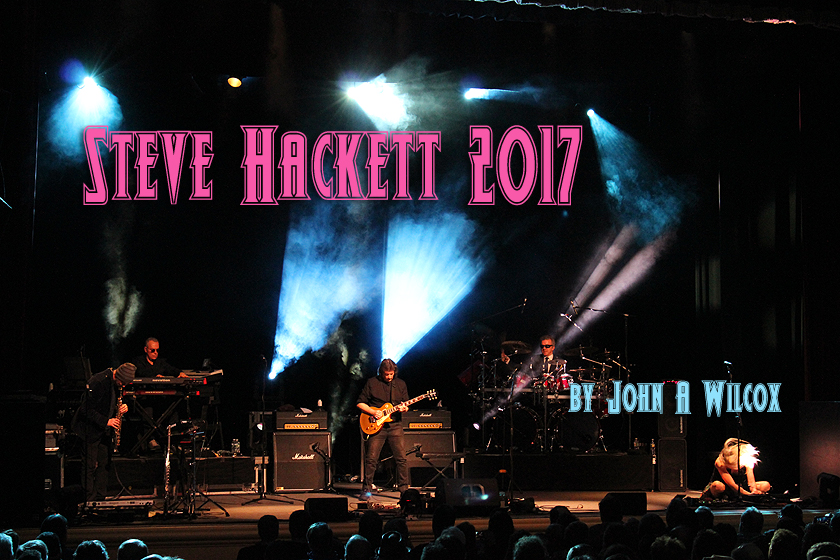
Interview and live photos by John A. Wilcox
Here we are in 2017. As always, Steve Hackett is a busy man and he's been cooking up some new adventurous music for his follow up to
Wolflight. It's called The Night Siren and we had a lovely chat about it! Here's what was said...
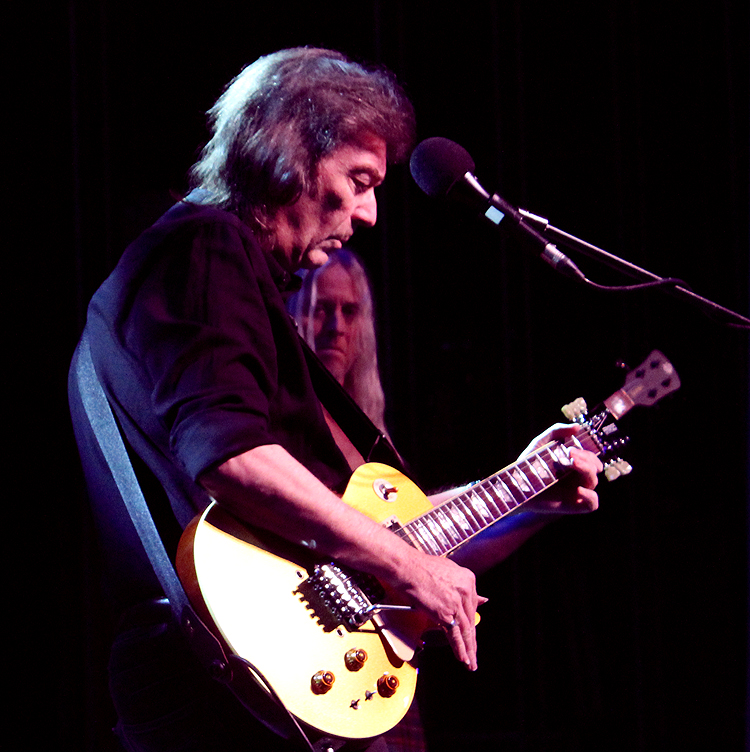
PS: The Night Siren has your old pal Dick Driver on it. Driver's been working with you again for some time now. How did you
reconnect?
SH: Dick and I go back to 1970 when he was a bassist in a band called Quiet World. We worked on the Quiet World album which was
called The Road in 1970. A year before I worked with Genesis. We kind of lost touch for several decades and then he got in touch with
me and said how much he enjoyed my stuff over the years. I wasn't even aware that he was aware of what I'd been up to. I asked him what he'd
done and he said he'd worked with orchestras and that he was doing classical music. He was playing Tchaikovsky and all sorts of stuff. He said
that he thought there was a line between the stuff that I was doing and the other stuff that he really enjoyed. Prokofiev and what have you. He
basically put me in touch with a whole bunch of really excellent classical players and we made a little team of mainly string players who were quite
willing to track up and turn themselves into a whole orchestra.
He was really my first connection or re-connection with classical music. I had worked with orchestras over the years, but sporadically. But this
meant that he put me in touch with some real virtuoso players - up to and including the present day. If we want an orchestral moment on an album,
he is kind of my first port of call. That's what we do. So you get orchestras on my stuff, but they might be orchestras of just a few individuals. I can't
always go out and hire the Royal Philharmonic even though I have had them on a few projects in the past. I suspect we work in a similar way to
ELO for tracking up the people. But it works wonderfully well if they've got the patience and I've got the time.
PS: Is he still the guy you knew in Quiet World?
SH: Well he still does play electric bass. It means that he straddles the 2 worlds. It's not just classical music, it's pop and rock as well. He
was very sweet gifted guy back then and he still is now. He's got more of a sort of statesman-like thing about him. I've said to him, did he ever
think of conducting because he's got the look of a conductor. You know - he's a man of experience and substance and skill. It's been a very
important connection for me. He put me in touch with a lady who plays not only virtuoso violin but also virtuoso viola as well. It's unusual to find
someone who plays both instruments equally well. Her father was a viola player and when he retired he handed on his instrument to his very gifted
daughter and that's Christine Townsend. She is a really extraordinary fine, fine player.
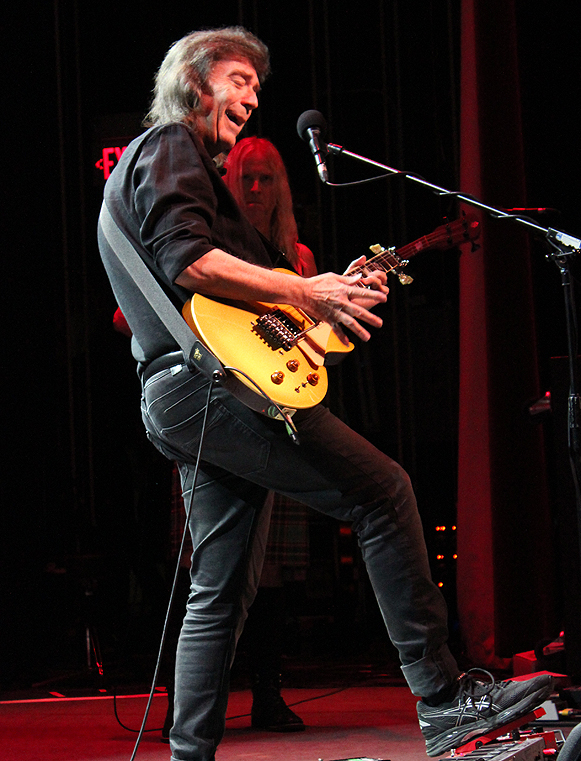
PS: Tell me about Inca Terra from The Night Siren.
SH: It's got a convoluted history, that one. Basically I traveled to Peru more than once. Both as a musician and as a tourist. Got to see
much of the Andes and the culture up close. What an extraordinary place that is if you've never visited. Not just Machu Picchu but many other
extraordinary places. Andean music that just seems to be free of gravity. The sound of the high tuned little short scale instrument - the Charango -
would be very familiar to many people, I think. Plus the Kanna is the flute when they normally play with fast vibrato often in harmony. It's a great
sound and it's often twinned with the pan pipe. So there is that sense of what is Peruvian, what is Andean. People are very familiar with that
sound. I basically wrote the song - I had the melody line and my wife Jo, I think, basically wrote the lyrics to that one. We decided to stick a bunch
of voices on it. I heard it as male and female voices originally. So we have Nad Sylvan sing on it along with me and Amanda Lehmann, who's my
wife's sister. In addition to that there is an Icelandic drummer called Gulli Briem and he plays with a band called Mezzoforte. He also plays with a
Hungarian band called Djabe, and I've worked with them quite a bit over the years. I get to access world music musicians via them. They phoned
me and said "We're gonna do some sessions in Southern Italy. Would you like to be part of that? We're gonna jam and then every one gets a
chance to use it. Take that data an make of it what they will." I said "sounds fascinating."
So you've got an Icelandic drummer, a British guitarist and a Hungarian band working in Italy together. Just doing freeform stuff for about 3 days/
We had a blast doing that. The drums that are on Inca Terra are 1 of the things that came out of those sessions. The fast furious
drumming from that really came from Gulli. I'm fan it's a favorite rhythm, the Bayong rhythm. It was one much beloved of Phil and I've used it quite
a lot because although it's a Latin rhythm, it goes very well with rock. Kind of synonymous with rock. There's something about it. It's got a little bit
more space in it than rock. What starts out very small on the track becomes bit, it goes through a number of changes and we end up with
something that sounds orchestral and slightly jazzy and slightly rocky and slightly fusiony. The term 'collision' would be perhaps the best one to
describe and make this 1 big monumental track. Many influences.
PS: A personal highlight is most definitely 50 Miles From The North Pole. How did it come together?
SH: There is a lot going on. I was playing with an orchestra in Iceland. I was working with a band called Todmobile. They've done some
magnificent orchestral arrangements of stuff that Jon Anderson had done with Yes. Jon flew out there and worked with them and they did
absolutely wonderful orchestral arrangements of stuff that had been an important part of his history. I said I'd like to work with you guys as well.
They did some orchestral arrangements of Genesis stuff. We did a concert 50 miles from the Arctic Circle. Literally 50 miles from the North Pole.
We happened to be there in January which is their coldest time of year. Iceland is a very cold country. It was the coldest time of year. It really did
feel like the Shackleton Expedition at times. It was extraordinary. Iceland has this black, forbidding, icy landscape. But at the same time it's very
dramatic and it's got things that Scotland's got, but on a larger scale. You have extraordinary volcanoes and geysers. Not just the frozen waste but
also, of course, the Aurora Borealis.
With that track, I wanted it to seem as if it was a journey through that landscape but in the style of a spy movie so I've got deliberately old
fashioned guitar on it. Not distorted. Playing in a kind of John Barry sort of way. As I say, it's a little bit like spy music. Mellotron flutes which figure
heavily throughout the album because there were times where I think it was all about mellotron strings and brass. That the favorite instrument was
always mellotron strings. It was hugely influential throughout all of progressive history, but the flute was the most of us first heard on the famous
introduction to Strawberry Fields Forever. That Beatle tune, when I first heard it, I thought they're using some old organ, I think. You could
hear that there was some wind in there somewhere. It sounds almost as if it was the weedy bellows of some old magical instrument. Re-
evaluating that thinking. Yeah, it's underused. Why don't we use more of that? So part of what we had with that track was the use of these flutes.
We sometimes use the flute instead of organ very often. I've veered away from that mainstay of progressive stuff, which is the Hammond organ
and instead supplanted if with mellotron flutes which I know Roger King, my co-hort, says he finds hugely characterful. It's one of those magic
sounds. It is an instrument in its own right. You forget that it's a flute player that played that originally. it becomes some thing else via the mellotron
and via the touch of the hand.
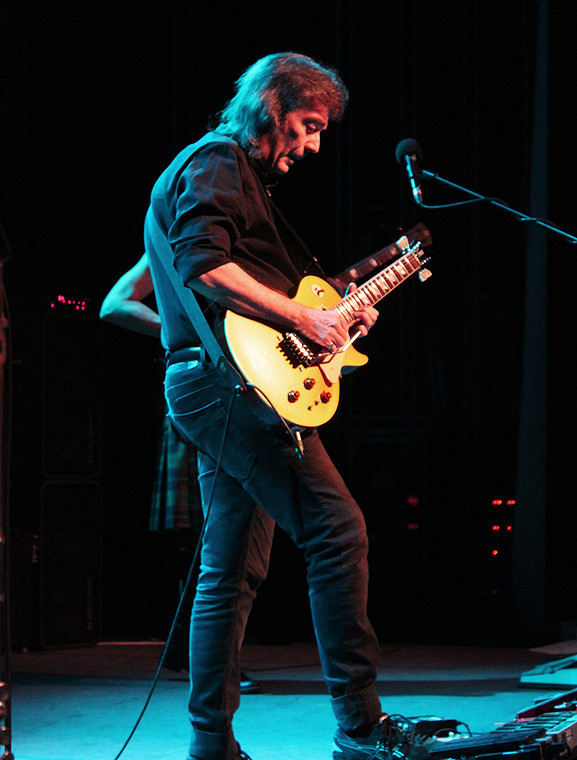
PS: I'd say that using the mellotron in different ways is, in fact, a progressive thing to do.
SH: I think so. I think part of what all musicians do is act as historians at times. So that thing that seems most ground breaking very often
- like when you suddenly start doing music perhaps more based on more rhythm and percussion than keyboard and based on harmony - means
that you're going right back to the bone orchestras back in the day, and the first things that created rhythm. So in effect, it's the idea of yes, you're
going back you're honoring the ancestors. You're doing something retro, but you may be complimented for doing something stark and original.
Where do you set the clock?
What's original? What's a contemporary instrument? Is it an electric guitar? Well then that's been with us a very long time so that's now a very
traditional instrument of course. The mellotron is a very early sampler. it's the rime of the early ancient sampler. We don't think of it as samples but
that's indeed what it was and what it is. Those sounds still crop up on records to this very day. There are times where nothing but a mellotron will
do. Which is ironic of course, because it's serving us instruments that would sound very different if they weren't cranking the chain and going via
the heads that serve it up on the mellotron itself. It does something to the sound. It's a Frankenstein as distinct from a newborn infant that you
stitched together from disembodied parts. It sounds strange, particularity at volume. I sometimes have conversations with another lover of
mellotron, and that's Nick Magnus, who I made many albums with. He said you know the mellotron has got a kind of cold warmth to it. It's as if
you're saying hello to your old alien friend, it's weird. It's like sixties sci fi or something like "Ah! Forbidden Planet! Ah! This Island
Earth!
Having said that, this album was stitched together from many performances from many people around the world. 20 people many of whom are
from many different corners of the globe. 1 person from Israel working with a person from Palestine. Gulli Briem from Iceland. And so on and so
forth. We have 4 different drummers on it. Nick D'Virgilio is on 1 track. He's on Martian Sea. In a sense it's a kind of United Nations of
music. I wanted to show that it's possible for people to work together in harmony.
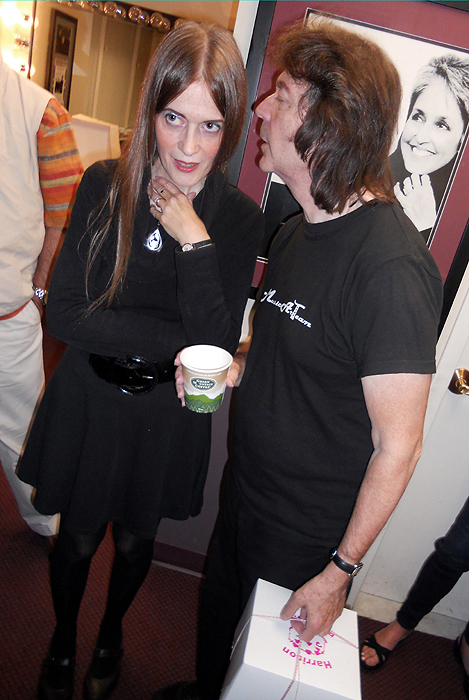
PS: I must say that in the decades that we've talked, I've never seen you as happy as you are nowadays. I attribute it to your remarkable wife
Jo. Would you agree?
SH: That's right. I think that I was very lucky to get together with my wife Jo. We became a full time couple 10 years ago. It's been an
extraordinary journey with her. Not just musically. She's taken me to places around the world I wouldn't have gotten around to. I would have just
said "oh well, the places on the tour." There are plenty of places that I go to as a musician. She said to me "what about Peru? China? Thailand?
Bangkok? Cambodia?" These places we have visited recently, Mexico, even though I have been to Mexico as a musician, I have to tell you, it's
not the same as exploring the country both on land and on sea.
Her effect has been hugely influential on the music. She's broadened my horizon considerably. I think that she's made me more socially aware,
and I have a songwriting partner as well as someone who works very, very hard on my business. Keeping it afloat and staying in touch with the
world, working with aspects of social media and all those aspects of management. But they come about so naturally. She doesn't feel as though
she does all the work and I get all the glory. There's more to it than that, we're very much a team. It's made a huge difference, I think. The fact that
she loves to travel. She's a real world traveler, she wants to see everywhere on the globe. It reminds me a little bit of the late great Ritchie Havens
who told a story about when he was a kid. His grandmother asked him what he wanted to do when grew up and he said "I want to meet
everybody." Jo said, when she was given a globe as a kid, she said "I want to travel to every single place on that map." She wanted to see the
whole world. So I do that with her. Sometimes I'm there just to carry the bags, believe me!
PS: A memory that comes to mind is having Jo serve me cake on her birthday a few years ago. I was struck by how gracious and welcoming
she was.
SH: If she can, she makes everyone feel welcome. If it's physically possible, she does it. She makes friends everyone, it's extraordinary,
I don't know how she does it. I think she deals with about 200 emails a day. How the Hell did you get back to everyone? How do you do it? She
says "it may take time but I will get back to everybody." That's how it works for her. She's extraordinarily committed. I don't know how she does it, I
just don't.
PS: It must be a natural ability for her.
SH: Oh yeah! I don't think it can be learned. You've either got that in you or you haven't. I find it extraordinary!!
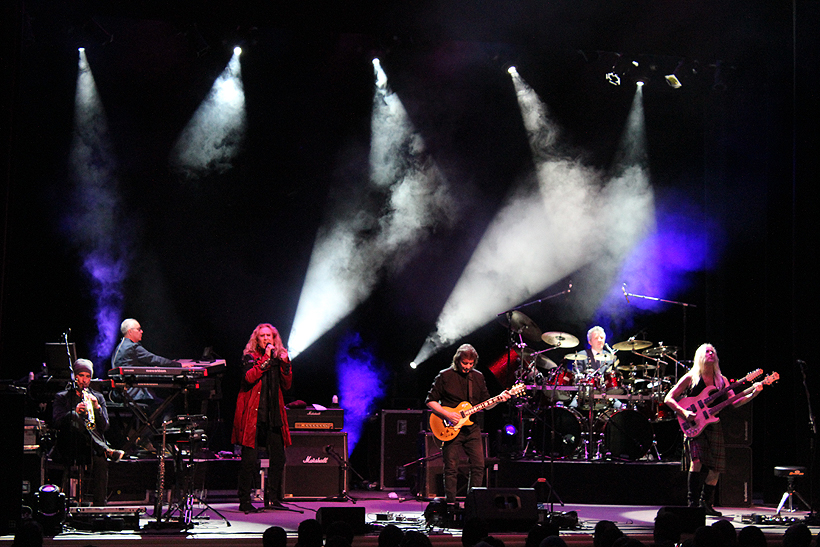
PS: You're touring and celebrating the 40th anniversary of Wind & Wuthering from your Genesis days. Inside And Out even
made it into the set!
SH: I know that the band do a wonderful version of that. It sounds really really good. The band really warmed to that. It sounds uncannily
like the original but then it goes into something that's got its own take, and right at the end of it it turns into a real celebration. Don't forget the guy
does get released in the end! I'm really pleased that I stuck it out for that one. It's a great tune. It should have been on the album. We played it a lot
live which means that we held it in great regard. We all held it in higher regard than some of the other things that bit the dust on the album back in
the day, live. I will be playing Eleventh Earl Of Mar and One For The Vine. Both of which are epics in a sense. Blood On
The Rooftops, In That Quiet Earth, Afterglow and finally Inside And Out. Not necessarily in that order. I like to think they are all great
tunes in their own way and I want to honor that album because it's its 40th anniversary. My last album with the band. I like to think we went out on a
high because it was a great album.
PS: How about the solo material in the set?
SH: That's changed. There are things that I've never played before from the new album. There are 3 things from the new album. These
are some tracks the band has never played before, they've never played those live. We're doing Anyway from The Lamb Lies Down
On Broadway. I do believe we're doing a track from each of the Genesis albums that I was involved with. There will be something for anyone
of the era of Genesis from 1971 to 1977 which specifically involves Peter Gabriel's era when Peter and Phil were in the band together and
celebrating also the era when for a short 2 years we became a 4 piece. That's the Wind & Wuthering era. We do Dance On A
Volcano from A Trick Of The Tail. Certain things have proved themselves to be great live numbers.
PS: You have a killer touring band with Roger King on keyboards, Nick Beggs on basses and guitar, Gary O'Toole on drums, Rob Townsend
on winds and percussion, and Nad Sylvan on vocals. A powerhouse ensemble!
SH: The last couple of days of doing rehearsals with the band did sound rather extraordinary I have to say. Particularly doing something
like El Nino for instance, from the new album, where we have 2 drummers. We've got Gary on his regular kit and Rob Townsend playing
a virtually along with him. It's something that's mainly tom tom driven, so it's got that aspect of something large and orchestral with a whole ton of
samples - but all played live - and a whole tribe going and a rock band. So you've got these aspects that make something sound absolutely
monumentally huge. I'm very pleased that we're able to do that. I think that anyone that walked into the rehearsals have been pinned to the back
wall just by the sheer size of that sound!
PS: The secret weapon here just might be Rob Townsend!
SH: He's an extraordinary soloist and very versatile. He's been doing more keyboard as well so we've been having a 2 keyboard set up.
Sharing out certain things. He's also been doing some of this percussion stuff. He is like a secret weapon. He's a virtuoso in familiar
territory but he's also been extremely adaptable on other stuff. That multi-instrumentalist factor is extraordinary. I think in some ways he provides
something of the same function that I saw with Ian McDonald with King Crimson originally. Playing so many instruments and so well.
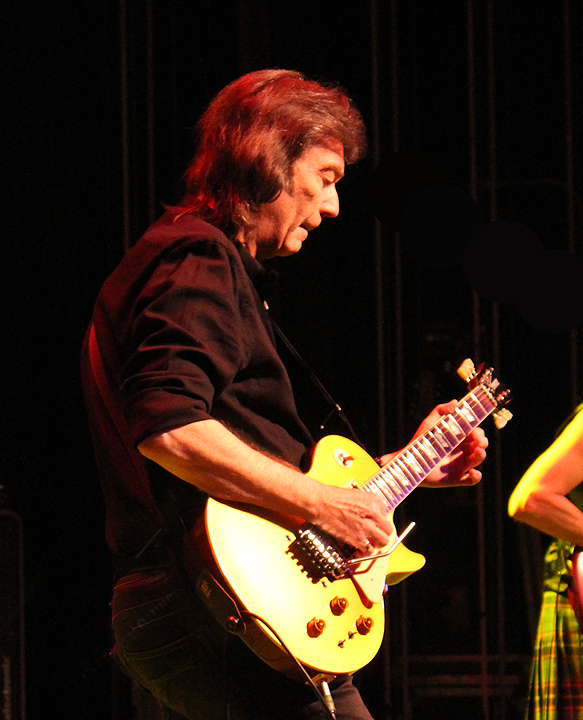
Special thanks to Dawn for typing this out!
###
Table Of Contents
Contact







